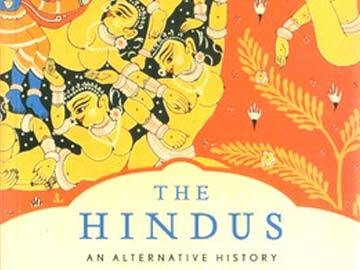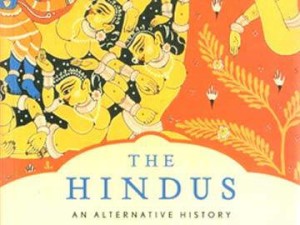
 Academics, writers, and lawyers have voiced strong opposition to the withdrawal of American scholar Wendy Doniger’s book, The Hindus: An Alternative History, following a settlement between the publisher Penguin, a division of Random House, and a complainant group, Shiksha Bachao Andolan Samiti. Under the settlement, all copies of the book will be removed and shredded in India.
Academics, writers, and lawyers have voiced strong opposition to the withdrawal of American scholar Wendy Doniger’s book, The Hindus: An Alternative History, following a settlement between the publisher Penguin, a division of Random House, and a complainant group, Shiksha Bachao Andolan Samiti. Under the settlement, all copies of the book will be removed and shredded in India.
A well-known Hindi literary critic, Namwar Singh, called the act as an “attack on writers’ freedoms”. After reading Doniger’s book, he said that he found it challenging. “It is not the kind of book that says ‘yes sir’ to everything. It challenges several beliefs. If Hindutva is so powerful and secure, it should tolerate it, and respond in kind. It is an open market, and the appropriate response to the written word is the written word itself, not a ban.”
In a jointly-issued statement against Penguin’s decision to withdraw the book, several of India’s leading academics, such as historian Partha Chatterjee (Centre for Studies in the Social Sciences, Kolkata), Nayanjot Lahiri, and Upinder Singh (department of history, Delhi University), criticized the situation.
Senior Supreme Court advocate KTS Tulsi also agreed with Singh’s view of countering one book with another. “There is a growing tendency of intolerance in a certain section of society against the letter and spirit of the Constitution. Penguin may have succumbed because they did not want to be physically attacked. It shows helplessness against unruly mobs. It is unfortunate that this should happen in India where we pride ourselves on freedom of speech,” he says.
Banned Books Awareness has catalogued a similar increase in society’s polarization in the United States over the last decade.
However, the lobbyist in the case, Dinanath Batra, couldn’t be happier with the decision because it means that his organization had “won the battle but has yet to win the war against faulty representation of Indian history and historical figures.”
He complained that the book had “a lot of dirt in it that caused me a lot of pain and hurt my sentiments” in reference to what he perceived as overly-sexualized Hindu religious figures and other claims in the book that Hindus once ate and sacrificed cows.
His organization, which is headquartered in Delhi, was registered in 2008 and is, ideologically, right-wing and socially conservative and said to be associated with the RSS. The Rashtriya Swayamsevak Sangh, the literal translation of which is National Volunteer Organization or National Patriotic Organization, is a right-wing, paramilitary, volunteer nationalist group. The RSS states that its ideology is based on the principle of “selfless service to the nation.” When asked, his legal team refused to confirm or deny the claim of association.
The RSS has been busy in recent years. In 2008, the Delhi high court had directed the removal of 75 “objectionable” paragraphs from history textbooks following a petition by the group. The organization has been particularly active in the field of education in India by insisting that schoolbooks reveal a history that “reflects India’s pride” and has also campaigned against sex education in schools.
The Satanic Verses was banned in India back in 1988. In 2012, when Rushdie was due to appear at the annual Jaipur Literature Festival, his visit was cancelled following reported threats from various extremist groups such as the RSS and SBAS. Even a video conference with the writer at the festival was stopped at the last moment.
Spanish author Javier Moro was sent a legal notice for his book on Sonia Gandhi and was criticized in newspaper reports for “exploiting somebody’s privacy for personal commercial gains.”
The Maharashtra state government banned the book Shivaji: Hindu King in Islamic India, by James Laine, in 2004 after demonstrations by Shiv Sena. The ban was briefly lifted in 2007 and again by the Supreme Court in 2010.
Jeet Thayil, who supported the inclusion Salman Rushdie’s infamously banned book at the Jaipur Literature Festival, told The Times of India over the phone that “it is unfortunate that a religion that is known for its tolerance is showing that fundamentalists are the same everywhere.”
Penguin, to their decreased credit, has played the victim card and blames the situation on what they called India’s “intolerant laws” and insists that they are committed to free thought and expression, but that they have the “same obligation as any other organization to respect the laws of the land in which it operates, however intolerant and restrictive those laws may be.”
That may seem a logical and legally-sound position, but the sad truth is that Penguin made its decision to remove the book purely for monetary reasons to save a buck. Had they chose to fight the ban, many legal experts agree that they would have certainly won because there was no fatwa, no official ban, no official court order, just a complaint filed. But now all of the citizens of India will lose because even if they download the PDF copy of the book off of the internet from other countries they will be breaking the law.
Rather than engaging in discussion to point out any flaws in the alternative historical accounts, the closed-minded fools at the RSS and the SBAS who called for the ban cower behind the decision to shred the work and all because it hurts their fragile feelings.
Someone hand them a box of tissues while I read Doniger’s book and await them at the debater’s podium. Somehow I don’t think they’ll show up.
For more information on the Banned Books Awareness and Reading for Knowledge project and the complete list of titles covered, please visit the official website at http://bbark.deepforestproductions.com/
Sources: Times of India, Daily Mail
© 2014 R. Wolf Baldassarro/Deep Forest Productions

Leave a Reply